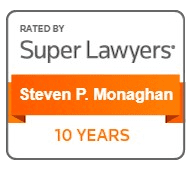
Monmouth County Collaborative Divorce
Helping Both Parties Find Mutually Beneficial Outcomes
When people come to the Law Office of Steven P. Monaghan, LLC, they are often surprised at the wide variety of options available for resolving a divorce. One option that you may not be aware of is collaborative divorce. This is a relatively new process that can allow you to resolve your divorce in a much less stressful manner than the traditional methods.
If you find that you and your spouse are either easily agreeing with each other or are very close in viewpoint as you discuss the issues in your divorce, you may be good candidates for collaborative law. Our team of Monmouth County collaborative divorce lawyers may be able to help.
How Does Collaborative Law Work?
In some ways, collaborative law is similar to mediation. It allows spouses to work together to reach mutually beneficial agreements — agreements that may be significantly different and more creative than the judgment provided if the case went to trial.
The Collaborative Divorce Process
In brief, here is an outline of the steps in a collaborative law process:
- Retain an attorney. But not just any attorney. One who is trained in the collaborative law process, because it is a vastly different approach than the traditional litigation approach.
- Gather the documents. Provide all pertinent documents to your lawyer, such as tax returns, statements from your investment and retirement accounts, bank records, and budgets, for example.
- Discuss your goals. Talk with your attorney about your goals for the case.
- Spouses meet. You, your spouse and your respective attorneys meet to confirm the collaborative process and to sign the collaborative law participation agreement.
- Further discussion. As many meetings as necessary are scheduled to resolve all of the issues in the divorce. These meetings may be just between the two of you and your respective attorneys or there may also be additional experts, such as financial and child care experts, called in to help you better understand the details so that you can arrive at a solid agreement.
- The agreement. Once all the issues have been addressed and the spouses agree, a divorce agreement is prepared and signed.
- Divorce judgment. In this, the final step, the agreement comes before a superior court judge and he or she incorporates that document into a binding court order.
If you want to learn more about collaborative law and how it may benefit you in your divorce, speak to the Monmouth County collaborative divorce attorney who pioneered the concept in New Jersey: Steven Monaghan at the Law Office of Steven P. Monaghan, LLC. Contact us today to get started!
Collaborative Law Vs. Litigation Vs. Mediation
One important distinction is that in litigation, each attorney has the duty to his or her own client. The compromise is found through an adversarial process, through bargaining from the extreme positions.
In a collaborative divorce, the attorneys are committed to seeking a resolution that is to the benefit of the family as a whole, as opposed to one that is beneficial just to one spouse. Attorneys who practice collaborative law receive special training that allows them to refocus their efforts in the collaborative way.
The collaborative divorce process itself is somewhat similar to mediation, but in many ways it is quite different. Unlike mediation, there is no third party guiding spouses through the process. Instead, spouses are each represented by a lawyer specifically trained in this process. The lawyer advises the spouse and provides important guidance throughout.
Another important element of collaborative divorce is that, at the beginning of the process, both parties must sign an agreement that they will see it through. If they do not, they must start over and retain new lawyers if they want to proceed with litigation. This is a powerful incentive to make the process work.
Benefits of Choosing Collaborative Divorce
Choosing collaborative divorce can offer a range of benefits for both parties involved. Unlike traditional litigation, collaborative divorce allows couples to work together to find mutually beneficial outcomes, rather than leaving the decisions in the hands of a judge. Some of the benefits of choosing collaborative divorce include:
- Reduced conflict and stress
- More control over the outcome
- Privacy and confidentiality
- Cost-effective compared to litigation
- Focus on the well-being of any children involved
Our experienced team at the Law Offices of Steven P. Monaghan can guide you through the collaborative divorce process and help you understand if it's the right choice for your situation. Contact our experienced Monmouth County collaborative divorce lawyers today to learn more about how collaborative divorce can work for you.
Will Collaborative Law Work for You in Your Divorce? Talk to Us.
To find out if the collaborative law process is right for your divorce, talk to one of the experienced Monmouth County collaborative divorce attorneys at the Law Office of Steven P. Monaghan, LLC.
Call (732) 624-6343 or contact us online today to schedule your consultation!

Meet Your Advocates
Personalized. Compassionate. Experienced.

-
 New Jersey Supreme CourtA New Jersey attorney who is certified by the supreme court as a civil trial attorney must have been a member in good standing of the New Jersey bar for over five years, fulfilled ongoing continuing legal education requirements, demonstrated a substantial level of experience in civil trial law, been favorably evaluated by other attorneys and judges familiar with his or her work and taken and passed a written examination in civil trial law.
New Jersey Supreme CourtA New Jersey attorney who is certified by the supreme court as a civil trial attorney must have been a member in good standing of the New Jersey bar for over five years, fulfilled ongoing continuing legal education requirements, demonstrated a substantial level of experience in civil trial law, been favorably evaluated by other attorneys and judges familiar with his or her work and taken and passed a written examination in civil trial law. -
 Super LawyersSuper Lawyers is a rating service of outstanding lawyers from more than 70 practice areas who have attained a high-degree of peer recognition and professional achievement. This selection process includes independent research, peer nominations, and peer evaluations. No aspect of this advertisement has been approved by the Supreme Court.
Super LawyersSuper Lawyers is a rating service of outstanding lawyers from more than 70 practice areas who have attained a high-degree of peer recognition and professional achievement. This selection process includes independent research, peer nominations, and peer evaluations. No aspect of this advertisement has been approved by the Supreme Court.

TURN TO OUR TEAM FOR GUIDANCE
WE HELP FAMILIES NAVIGATE TO THE NEXT CHAPTER
-
Recognized for Quality Divorce Counsel
-
Certified by the Supreme Court of New Jersey
-
Practicing Family Law Exclusively
-
Over 60 Years of Combined Experience
-
Recognized & Trusted by the New Jersey Community
-
Free In-Person Consultations





